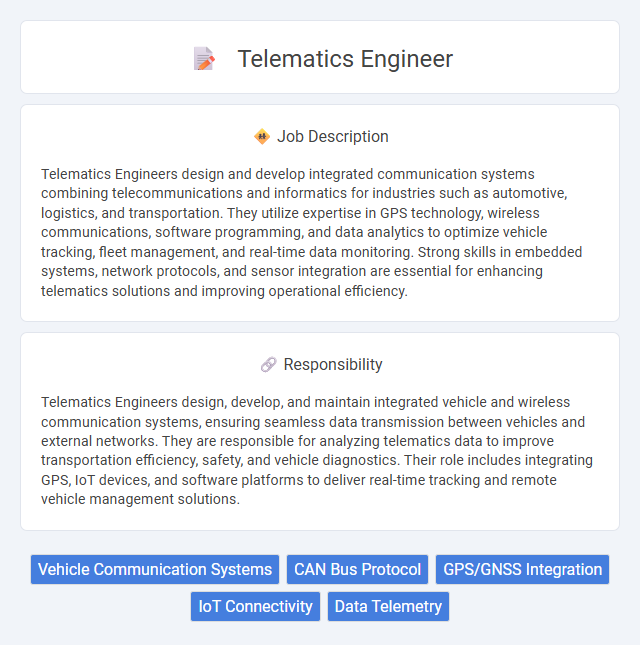
Telematics Engineers design and develop integrated communication systems combining telecommunications and informatics for industries such as automotive, logistics, and transportation. They utilize expertise in GPS technology, wireless communications, software programming, and data analytics to optimize vehicle tracking, fleet management, and real-time data monitoring. Strong skills in embedded systems, network protocols, and sensor integration are essential for enhancing telematics solutions and improving operational efficiency.
Individuals with strong analytical skills and an interest in technology are likely suitable for a Telematics Engineer role. Those comfortable working with data, software, and hardware integration may find the job aligns well with their strengths. People who prefer routine tasks or lack adaptability might face challenges in this dynamic and evolving field.
Qualification
Telematics Engineers typically require a bachelor's degree in electrical engineering, computer science, or automotive engineering, with a strong emphasis on telecommunications and embedded systems. Proficiency in software development, vehicle communication protocols, and wireless networks is essential for designing and maintaining telematics systems. Certifications in IoT technologies, cybersecurity, and data analytics can significantly enhance job prospects and technical expertise in this field.
Responsibility
Telematics Engineers design, develop, and maintain integrated vehicle and wireless communication systems, ensuring seamless data transmission between vehicles and external networks. They are responsible for analyzing telematics data to improve transportation efficiency, safety, and vehicle diagnostics. Their role includes integrating GPS, IoT devices, and software platforms to deliver real-time tracking and remote vehicle management solutions.
Benefit
A Telematics Engineer likely benefits from increased demand in connected vehicle technology, leading to promising job stability and career growth. The role probably offers opportunities to work with cutting-edge systems in automotive and telecommunication industries, enhancing technical skills and innovation experience. Competitive salaries and potential for travel or remote work may also contribute to the overall job appeal.
Challenge
A Telematics Engineer faces the challenge of integrating complex data systems with automotive technologies to enhance vehicle communication and safety. They likely navigate evolving software standards and hardware constraints while ensuring real-time data accuracy and security. The role probably demands innovative problem-solving to keep pace with rapid advancements in connected vehicle technology.
Career Advancement
A Telematics Engineer leverages expertise in telecommunications, vehicle systems, and data analysis to drive innovation in connected vehicle technologies, autonomous driving, and fleet management solutions. Career advancement often involves progressing to senior engineering roles, project management, or specialized fields such as IoT integration and cybersecurity within automotive systems. Mastery of emerging technologies like 5G, machine learning, and cloud computing can significantly enhance opportunities for leadership positions and cross-industry collaboration.
Key Terms
Vehicle Communication Systems
Telematics Engineers specialize in designing and optimizing vehicle communication systems that enable seamless data exchange between vehicles and external networks. They develop embedded software and hardware solutions for GPS, cellular, and wireless communication protocols to improve vehicle diagnostics, navigation, and fleet management. Expertise in IoT integration, CAN bus technology, and cybersecurity ensures reliable and secure telematics system performance.
CAN Bus Protocol
A Telematics Engineer specializing in CAN Bus Protocol designs and implements communication systems for vehicle networks, ensuring efficient data exchange between electronic control units (ECUs). Expertise in CAN bus message arbitration, error handling, and data decoding is critical for optimizing real-time diagnostics and telematics applications. Proficiency with tools such as Vector CANalyzer and knowledge of ISO 11898 standards enhance system reliability and performance in automotive telematics solutions.
GPS/GNSS Integration
A Telematics Engineer specializing in GPS/GNSS integration designs and implements advanced location tracking systems to enhance vehicle navigation and fleet management. Expertise in satellite communication protocols, real-time data processing, and sensor fusion ensures accurate positioning and reliable connectivity. Proficiency in embedded systems programming and network infrastructure supports seamless integration of GPS/GNSS modules into telematics solutions for optimized route planning and asset monitoring.
IoT Connectivity
Telematics Engineers specialize in integrating IoT connectivity solutions to optimize vehicle communication systems, enabling real-time data transmission between vehicles and cloud platforms. Expertise in wireless communication protocols such as LTE, 5G, and Wi-Fi enhances GPS tracking, vehicle diagnostics, and remote monitoring capabilities. Proficiency in embedded systems, cloud computing, and cybersecurity ensures secure and efficient data flow critical to connected vehicle technologies.
Data Telemetry
A Telematics Engineer specializing in Data Telemetry designs and manages systems that collect, transmit, and analyze real-time data from remote sensors and devices. Expertise in GPS, IoT communication protocols, and data integration platforms optimizes vehicle tracking, fleet management, and remote diagnostics. Proficiency in software development, data analytics, and network security ensures efficient telemetry data flow and actionable insights for operational improvement.
 kuljobs.com
kuljobs.com